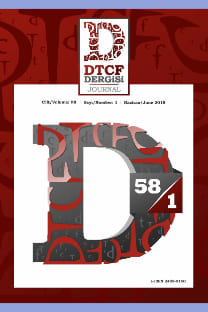BOUNDARIES OF CONNECTION AND DISTINCTION: AN OUTSIDER'S MANEUVERS, PRACTICES, AND TASTES IN GUARE'S SIX DEGREES OF SEPARATION
Bağlantı ve Ayrım Sınırları: Guare'ın Altı Derece Uzak'ında Bir Dışlanmışın Manevraları, Pratikleri ve Beğenileri
___
BIGSBY, Christopher. (2004). "John Guare". In Contemporary American Playwrights. (1-46). New York: Cambridge UP.BOURDIEU, Pierre. (1986). Distinction: A Social Critique of Judgment of Taste. (Trans. Richard Nice). London: Routledge & Kegan Paul.
---. (1996). "Physical Space, Social Space and Habitus." In Rapport 10: 1996. Oslo: Institutt for sociologi og samfunnsgeografi, University of Oslo.
BRYER, Jackson R., ed. (1995). "John Guare". In The Playwright's Art: Conversations with Contemporary American Dramatists. (70-85). New Brunswick: Rutgers UP.
CHEEVER, Abigail. (2010). Real Phonies: The History of Authenticity, 1947-- 1998. Athens: U of Georgia P.
CLUM, John M. (1992). Acting Gay: Male Homosexuality in Modern Drama. New York: Columbia UP.
DARGIS, Manoh, and A. O. Scott. (2009, January 18). "How the Movies Made a President." New York Times.
DEANS, Jill R. (1998). 'Divide the living child in two': Adoption and the Rhetoric of Legitimacy in Twentieth-Century American Literature. (Doctoral dissertation). U of Massachusetts, Amherst.
DE CERTEAU, Michel. (1984). The Practice of Everyday Life. (Trans. Steven F. Rendall). Berkeley: U of California P.
EVANS, Nicola. (2002). "The Family Changes Colour: Interracial Families in Contemporary Hollywood Film". Screen. 43 (3): 271-92.
FOUCAULT, Michel. (1986). "Of Other Spaces". Diacritics. 16 (1): 22-27.
GILLIAN, Jennifer. (2001). "'No One Knows You're Black!': 'Six Degrees of Separation' and the Buddy Formula". Cinema Journal. 40 (3): 47-68.
---. (2002). "Staging a Staged Crisis in Masculinity: Race and Masculinity in Six Degrees of Separation". In New Readings in American Drama: Something's Happening Here. (Ed. Norma Jenckes). (23-38). New York: Peter Lang.
GUARE, John. (1992). Six Degrees of Separation. London: Cox & Wyman Ltd.
LEFEBVRE, Henri. (1991). The Production of Space. (Trans. Donald Nicholson Smith). Oxford: Blackwell.
NEWMAN, M. E. J. (2000). "Models of the Small World". Journal of Statistical Physics. 101 (3/4): 819- 841.
PLUNKA, Gene A. (2002). The Black Comedy of John Guare. Newark: U of Delaware P.
ROMÁN, David. (1993). "Fierce Love and Fierce Response: Intervening in the Cultural Politics of
Race, Sexuality, and AIDS". In Critical Essays: Gay and Lesbian Writers of Color. (Ed. Emmanuel S. Nelson). (195-219). New York: Harrington Park.
SCHULTZ, Ray. (2004). "Six Degrees of Separation/The Seagull". Theatre Journal. 56 (1): 109-113.
SLETHAUG, Gordon E. (2000). Beautiful Chaos: Chaos Theory and Metachaotics in Recent American Fiction. Albany: State U of New York.
SMITH, Neil, and Cindi Katz. (1993). "Grounding Metaphor: Towards a Spatialized Politics". In Place and the Politics of Identity. (Ed. Michael Keith and Steve Pile). (67-83). London: Routledge.
SOJA, Edward W. (1989). Postmodern Geographies: The Reassertion of Space in Critical Social Theory. London: Verso.
---. (1996). Third Space Journeys to Los Angeles and Other Read-and-Imagined Places. Massachusetts: Blackwell.
WARF, Barney, and Santa Arias. (2009). "Introduction: The Reinsertion of Space into the Social Sciences and Humanities". In The Spatial Turn: Interdisciplinary Perspectives. (Ed. Barney Warf and Santa Arias). (1-10). New York: Routledge.
ZIMMERMAN, David A. (1999). "Six Degrees of Distinction: Connection, Contagion, and the Aesthetics of Anything". Arizona Quarterly: A Journal of American Literature, Culture, and Theory. 55 (3): 107-33.
- ISSN: 0378-2905
- Yayın Aralığı: 2
- Başlangıç: 1942
- Yayıncı: Ankara Üniversitesi Dil ve Tarih-Coğrafya Fakültesi
RÉFLEXIONS SUR L'ANGOISSE DE LA MORT: GILGAMESH, DOMRUL LE FOU ET MONTAIGNE
ESKİ ASURCA METİNLERDE TABLET KAPLARI VE KÜLTEPE'DEN ARKEOLOJİK ÖRNEKLER
KAVRAMSAL ULAMLAMA VE ÖNTÜRLER
NAZIM HİKMET'İN YANKISI İSPANYA'DA
UNUTULMUŞLUĞUN KARANLIĞINDA BİR ŞAİR
SAFEVÎ ÇAĞINA AİT ÜÇ TÜRKÇE MEKTUP VE DEĞERLENDİRİLMESİ
SOVIET KOREAN (KORYO-IN) IN CENTRAL ASIA AND KOREAN RELIGIOUS ACTIVITIES IN POST-SOVIET
